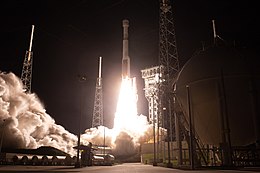
Back رحلة بوينغ المدارية الاختبارية Arabic Boeing Orbital Flight Test Czech Boe-OFT German Prueba de vuelo orbital de Boeing Spanish Boe-OFT French Boeing Orbital Flight Test Italian ボーイング軌道飛行試験 Japanese Boeing Orbital Flight Test Latvian/Lettish Boe-OFT Dutch Boeing Orbital Flight Test Portuguese
 The maiden Atlas V N22 launch | |
| Names | Boe-OFT |
|---|---|
| Mission type | Flight test |
| Operator | Boeing Defense, Space & Security |
| COSPAR ID | 2019-094A |
| SATCAT no. | 44900 |
| Mission duration | 8 days (planned) 2 days, 1 hour, 22 minutes (achieved) |
| Spacecraft properties | |
| Spacecraft | Boeing Starliner Calypso[1] |
| Spacecraft type | Boeing Starliner |
| Manufacturer | Boeing Defense, Space & Security |
| Launch mass | 13,000 kg (29,000 lb) |
| Start of mission | |
| Launch date | 20 December 2019, 11:36:43 UTC (6:36:43 am EST)[2][3] |
| Rocket | Atlas V N22[a] AV-080 |
| Launch site | Cape Canaveral, SLC-41 |
| Contractor | United Launch Alliance |
| End of mission | |
| Landing date | 22 December 2019, 12:58:53 UTC |
| Landing site | White Sands Space Harbor |
| Orbital parameters | |
| Reference system | Geocentric orbit |
| Regime | Low Earth orbit |
| Perigee altitude | 187 km (116 mi) |
| Apogee altitude | 222 km (138 mi) |
| Inclination | 51.63° |
| Period | 90.00 minutes |
 Boeing Starliner Orbital Flight Test mission patch | |
The Boeing Starliner Orbital Flight Test (also known as Boe-OFT) was the first orbital mission of the CST-100 Starliner spacecraft, conducted by Boeing as part of NASA's Commercial Crew Program. The mission was planned to be an eight-day test flight of the spacecraft, involving a rendezvous and docking with the International Space Station (ISS), and a landing in the western United States. The mission was launched on December 20, 2019 at 11:36:43 UTC or 06:36:43 AM EST; however an issue with the spacecraft's Mission Elapsed Time (MET) clock occurred 31 minutes into flight. This anomaly caused the spacecraft to burn into an incorrect orbit, preventing a rendezvous with the International Space Station (ISS). The mission was reduced to just two days, with the spacecraft successfully landing at White Sands Space Harbor on December 22, 2019.
On 6 April 2020, Boeing announced that it would conduct another Orbital Flight Test to prove and meet all of the test objectives. NASA accepted the proposal from Boeing to do another uncrewed test flight, Boeing Orbital Flight Test 2 (Boe-OFT-2).[4]
- ^ Williams, Sunita [@Astro_Suni] (December 22, 2019). "A couple of the awesome people who brought Calypso home! Thank you Steve and Kayva!" (Tweet). Archived from the original on June 6, 2021 – via Twitter.
 This article incorporates text from this source, which is in the public domain.
This article incorporates text from this source, which is in the public domain.
- ^ Clark, Stephen (December 3, 2019). "Launch of first Starliner orbital test flight slips to December 19". Spaceflight Now. Archived from the original on May 24, 2024. Retrieved December 3, 2019.
- ^ Clark, Stephen (December 18, 2019). "Live coverage: Overnight countdown underway for Friday's Starliner launch". Spaceflight Now. Archived from the original on August 7, 2024. Retrieved January 18, 2021.
- ^ Burghardt, Thomas (July 7, 2020). "NASA and Boeing Complete Starliner Orbital Flight Test Investigation". NASASpaceflight.com. Archived from the original on August 5, 2024. Retrieved August 10, 2020.
Cite error: There are <ref group=lower-alpha> tags or {{efn}} templates on this page, but the references will not show without a {{reflist|group=lower-alpha}} template or {{notelist}} template (see the help page).